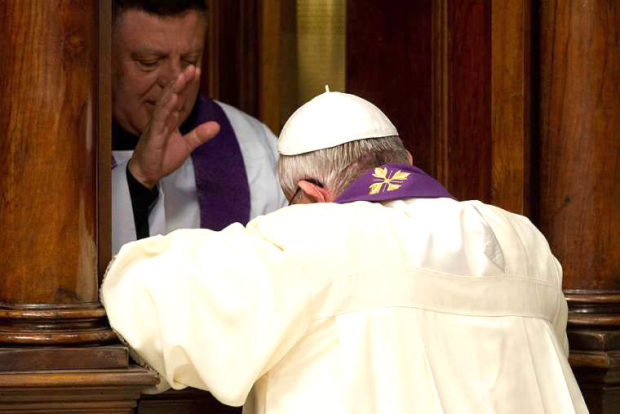Challenging the Seal of Confession — no way, it’s inviolable!

Pope Francis at confession. VATICAN MEDIA
The civil governments in the United States, the United Kingdom, Ireland, and Australia try to pass laws that would compel Catholic priests to violate the sacramental seal. Their objective is to report all instances of child sexual abuse they hear in the confessional.
No way! It’s superior to doctor-patient confidentiality. From the professional perspective, the priest-penitent privilege is inviolable. From canonical perspective, Canon Law also utterly forbids its violation. As one of the Seven Sacraments instituted by Jesus Christ himself, the Seal of Confession is sacred and, therefore, absolutely inviolable.
Regarding its sacredness, St. Thomas Aquinas devoted one full section of his Summa Theologica defending the divine institution of confession and its confidentiality (Supplementum III, Question 11). Hence, by essence, confessional confidentiality is professional, canonical, and sacramental.
Catholic response 1: Civil disobedience
The penitent’s trust in the priest is complete and rock-solid. He believes that the confessor is an alter Christus, another Christ! So, when a person goes to confession, he bares his soul before God by telling the details of his sins.
Fundamentally, confession is an internal forum, and it cannot go “outside.” When it’s allowed to go “outside,” the dignity of the person who trusts the priest is ruined and the sacredness of the Sacrament is bastardized.
In California, when the Seal of Confession was challenged by law, the Bishop of Oakland called for civil disobedience. Rather than comply with a state law that would force priests to violate the Seal of Confession, he declared he was willing to accept arrest and prison.
He explained that “the protection of your right to confess to God and have your sins forgiven in total privacy must be protected.”
Catholic response 2: Martyrdom
St. John of Nepomuk was the confessor to Queen Johanna, the wife of Wenceslaus IV of today’s Czech Republic. Known for his jealousy-driven outbursts, the king suspected his wife of being unfaithful and demanded St. John to reveal what she confessed. In 1393, the holy confessor chose to die rather than violate the Seal of Confession.
When he is forced to reveal it, the confessor’s response of “I do not know” could only be understood as “I do not know with knowledge outside the Seal of Confession.” As St. Thomas Aquinas has put it: “Since a man (confessor) knows it, not as man, but as God knows it.”
Every ordained priest has made a solemn promise to Jesus Christ and, when the Seal of Confession is challenged by civil authority, he would be ready to offer his dear life.
Jose Mario Bautista Maximiano (jomaximiano@gmail.com) is the author of Pope Francis, the Catholic Bishop, and the Priest (Claretian, 2014), “2015 Best Book in Theology” by the Cardinal Sin Catholic Book Awards and the Catholic Mass Media Awards. Available at amazon.com.

